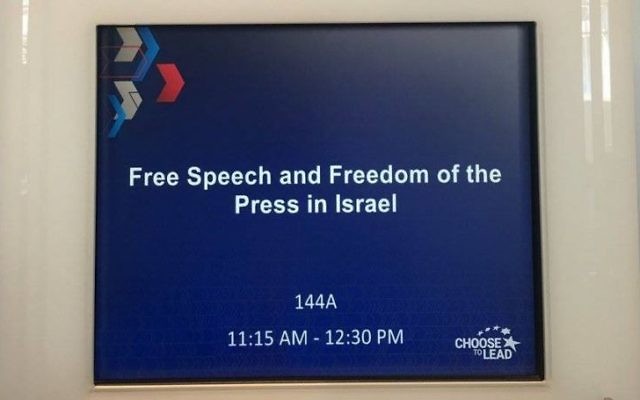Our View: Open Up, AIPAC
The pro-Israel action committee and its supporters would be better off if the media had more access.
The AIPAC Policy Conference is likely the largest gathering of Jews in the United States each year. Hundreds of Atlantans (Jewish and non-Jewish) make the March pilgrimage to Washington with 18,000 or so others who want AIPAC to succeed in protecting the special relationship between the United States and Israel and preventing Israel from becoming a partisan issue.
While the political superstars — this year including Prime Minister Benjamin Netanyahu, Vice President Mike Pence, U.S. Ambassador to the United Nations Nikki Haley, and Guatemalan President Jimmy Morales, whose nation is following the U.S. lead in moving its embassy to Jerusalem this spring — produce headlines and have videos of their speeches posted online, the bulk of the activity at the AIPAC conference is shrouded in mystery.
That’s because the breakout sessions, where people dig into the nitty-gritty of issues related to Israel with people at the grass roots, are almost uniformly closed to the media. It’s an approach that reflects AIPAC’s quiet but consistent anti-press posture, which is bad for us in the media, bad for those who care about Israel, and bad for AIPAC itself.

The perfect image of AIPAC’s wrongheaded attitude emerged Sunday, March 4, the first day of the Washington conference. Outside a session titled “Free Speech and Freedom of the Press in Israel” was this sign: “THIS SESSION IS OFF THE RECORD AND CLOSED TO THE PRESS.”
Let that sink in: The press was banned from a discussion about freedom of the press.
This problem is not limited to AIPAC’s national gathering. AIPAC recently held its annual Atlanta community event at Mercedes-Benz Stadium with Pulitzer Prize-winning columnist Bret Stephens of The New York Times speaking. But you didn’t see any coverage in the AJT because everything AIPAC does locally is off the record.
It’s particularly aggravating when the speaker is a fellow member of the press, such as Stephens or Charles Krauthammer a few years ago, because they aren’t asking to have doors slammed in reporters’ faces.
It’s so hard to get an on-the-record comment from AIPAC — and only from the national office — that we’ve stopped trying. But our online partners at the New York Jewish Week have maintained a dialogue with AIPAC about opening the doors, and the only explanation they’ve received is that the lobbying group doesn’t want a media presence to deter people from speaking their minds.
In an age of texting and tweeting, no one speaking to a crowd, with or without the press in the room, should expect anything to remain a secret, and we doubt many people do. We suspect AIPAC just likes to maintain a sense of mystery that brings an aura of power and perhaps increases people’s desire to pay to see what’s inside.
Regardless of the reason, shutting out the media is bad policy. AIPAC misses out on free publicity from its events, and it blocks the access that could lead to better understanding and more sympathetic coverage.
If you wonder why J Street gets more media attention than its numbers warrant, it’s because AIPAC’s left-leaning rival welcomes media to its events and actually talks to us. If you’re active in AIPAC, we urge you to push back against this counterproductive policy toward the press.




comments